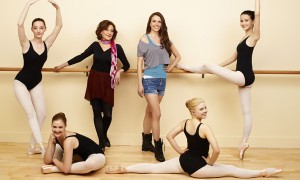[revision] four parts funny, one part sad: bunheads vs. girls
Each week “Revision” holds two TV shows up to the light to figure out if they are friends or foes.
First things first: Mel is Jessa, Ginny is Shoshanna, Sasha is Marnie, and Boo is Hannah. The comparisons may not be perfect, but hey, someone had to do it.
Girls needs no introduction; obviously it gets crazy press every time an episode is released, being touted as groundbreaking-this, provocative-that. But what about Bunheads? Another show about staring womanhood in the face, told with the same tonal recipe: heavy on the laughs, with a pinch of straightfaced drama to keep ’em coming back. It’s been critically well received, but its traditional network-comedy style seems to preclude it from much serious discussion. This is not unfair—at its heart it’s a sitcom with dance interludes—but I’d argue that Girls doesn’t really have much more substance. Just replace the family-friendly ballet sequences with its trademark awkward raunch (and a bigger budget) and I reckon the comparison is a fair one.
I wouldn’t call Girls an “issues” show in the vein of, say, its HBO relative The Wire. It’s about nothing more than its characters’ day-to-day tribulations and finding the absurd humour in the lives of average (white, mostly straight) young Americans. But its title and its frank style have placed a huge weight on its shoulders, and suddenly what was a sort of Judd-Apatow-but-about-women comedy series had to be the voice of a generation, and is even charged with representing all modern young women. Which it doesn’t really; it’s more about the minute-to-minute laugh than lasting insight into the collective psyche of today’s youth. It’s very funny when it’s on form, and most of that humour comes from pointing a finger at tooth-grindingly true moments that we can all recognise. In that sense it’s a great show, using laughter to make us confront ugly little pieces of our lives that we might otherwise never have discussed. But what does it say beyond that? I’d argue not much, which might be the point—these characters are too self-centred and directionless to possess the ability to tell us anything about greater humanity—but even so, I feel that this is the show’s biggest drawback.
Now, Bunheads. Much in the same way as Girls, its dramatic scenes are usually characters shouting their feelings at one another until one storms out, but that’s of a piece when it comes to sitcoms that use dramatic hooks (as opposed to the higher brow, adult oriented Girls which I expect more from). The story of an ex-showgirl who is uncertain of her direction in life, and four of her teenage ballet pupils at a small town dance school, Bunheads comes from Amy Sherman-Palladino, whose fingerprints are just as visible on her earlier show Gilmore Girls (or so I’m told, I’ve never seen it). Episodes mostly consist of rapidfire, reference-heavy dialogue that has the effect of forcing you to choke down your laughter in case you miss the next zinger. Sprinkle in occasional dance set-pieces executed with more style than any low-budget sitcom has a right to, and you have a winning recipe.
But there is more to Bunheads than meets the eye. Its characters have direction and ambition, rather than floating in Girls‘ vague, directionless fug. Yes, it’s about characters who are younger and confronting the more concrete issues of passing through adolescence, but Adam and Hannah’s relationship never had me craving the next episode in the same way that waiting for the adorably clueless Boo to get her first kiss did. And oh, when that kiss comes; I was cheering at my laptop screen. My point is that comedy must necessarily be rooted in drama, which is something that both shows understand, but drama must have direction and structure in order to be satisfying—as opposed to comedy which generally has a scene-by-scene payoff—which is a lesson that Girls could take from its younger (albeit simpler) counterpart.
Happily, both these shows are examples of TV that is created by women, without having to be boxed-in by that label. Yes, Girls struggles under the weight of having to live up to its name, but I think that when it’s truest to itself, it shares Bunheads‘ knack for being funny and insightful in a distinctly feminine way, but are nonetheless universally entertaining—unshackled from the wrongheaded marketing idea that TV about women is necessarily limited to having an exclusively female audience.
image credit (1)


